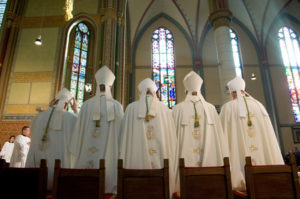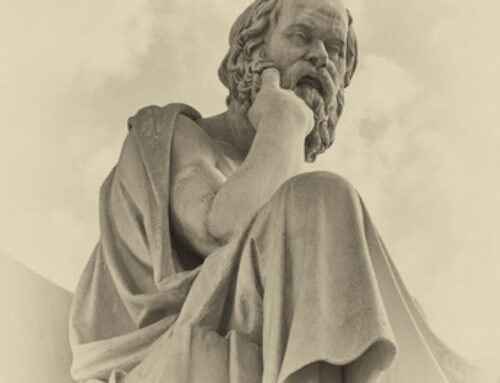 The US Conference of Catholic Bishops and individual dioceses were quick to respond to the murder of George Floyd and the ensuing protest demonstrations. One striking feature of many of those responses is their well-meaning but badly flawed view of racism. Let’s examine what they said and did, starting with the statement of my diocese in St. Petersburg Florida.
The US Conference of Catholic Bishops and individual dioceses were quick to respond to the murder of George Floyd and the ensuing protest demonstrations. One striking feature of many of those responses is their well-meaning but badly flawed view of racism. Let’s examine what they said and did, starting with the statement of my diocese in St. Petersburg Florida.
The opening statement read as follows: “Violent actions against African Americans have become all too common. When we witness those actions, such as the one that took the life of George Floyd, we know it is our responsibility to respond. Our faith calls us to speak out against racism and work to transform structures that continue to disregard the equal dignity of all people. [We offer here] resources below to help us pray, learn, and act together to transform our hearts, our policies, and our country.” [Author’s note: iItalics here and throughout are mine.]
This phrasing clearly was referring to the condition known as “systemic racism.” I say this because it speaks not of solving a problem or correcting abuses but of transforming structures, hearts, policies, and the entire country. More on that later.
The message went on to announce a prayer vigil: “In solidarity with all people of good will who seek racial harmony and an end to racial injustice, the Diocese of St. Petersburg will host a prayer vigil . . . Signs are also encouraged . . . “ [The recommended signs included:] ‘End Racism; Racial Justice is a Life Issue; Let me Breathe; More Dialogue. Less Fear; Really Listen to those Different from you.’ The Diocese of St. Petersburg is committed to promoting racial justice and racial harmony.”
The website also provided links to the following magisterial statements:
Pope Francis: “Dear brothers and sisters . . . I have witnessed with great concern the disturbing social unrest in your nation in these past days, following the tragic death of Mr. George Floyd. My friends, we cannot tolerate or turn a blind eye to racism and exclusion in any formand yet claim to defend the sacredness of every human life. At the same time, we have to recognize that ‘the violence of recent nights is self-destructive and self-defeating. Nothing is gained by violence and so much is lost.’ Today I join . . . in praying for the repose of the soul of George Floyd and of all those others who have lost their lives as a result of the sin of racism.”
St. Petersburg Bishop Gregory Parkes: “The manner in which George Floyd died is an atrocity to the humanity and dignity that each person has as a child of God. As a Church, we stand in solidarity with peaceful protesters who demand justice and respect for black individuals who have suffered the effects of racism for generations.”
President of the U.S. Conference of Catholic Bishops (USCCB) Archbishop José H. Gomez: “We should not let it be said that George Floyd died for no reason. We should honor the sacrifice of his life by removing racism and hate from our hearts and renewing our commitment to fulfill our nation’s sacred promise — to be a beloved community of life, liberty, and equality for all.”
USCCB: “Racism is not a thing of the past or simply a throwaway political issue to be bandied about when convenient. It is a real and present danger that must be met head on. As members of the Church, we must stand for the more difficult right and just actions instead of the easy wrongs of indifference. We cannot turn a blind eye to these atrocities and yet still try to profess to respect every human life. We serve a God of love, mercy, and justice.”
Joint statement of seven bishops who chair USCCB committees: “We are broken-hearted, sickened, and outraged to watch another video of an African American man being killed before our very eyes. What’s more astounding is that this is happening within mere weeks of several other such occurrences. This is the latest wake-up call that needs to be answered by each of us in a spirit of determined conversion.”
Only two of the statements spoke of any events other than Floyd’s murder and the peaceful protest. One was Pope Francis’ strong condemnation of the violence. The other was the seven bishops’ statement that devoted 21 words out of a total of 615 to similar condemnation. Not one of the other three statements decried the looting, assaults, arson, and property destruction that accompanied the protests. And not one of the three offered words of condolence or prayer for the storeowners who were victimized or for the police officers assaulted with bricks or two-by-fours and Molotov cocktails, maimed, and even killed while protecting citizens from crime and anarchy.
On the other hand, all five of the statements included wording like the following: [We must] “speak out against racism and work to transform structures that continue to disregard the equal dignity of all people . . . and to transform our hearts, our policies, and our country”; “we cannot tolerate or turn a blind eye to racism and exclusion in any form”; “[we] demand justice and respect for black individuals who have suffered the effects of racism for generations”;”[we stand for] removing racism and hate from our hearts”; “ and “Racism is not a thing of the past or simply a throwaway political issue . . . It is a real and present danger that must be met head on.”
Note that the bishops repeatedly used the word “racism” instead of “prejudice,” “bias,” or “discrimination.” Racism is the “in” word, of course, but it is more inflammatory than the others, so it would have been prudent for bishops to have avoided it. The word “racism” feeds the radical liberal narrative of one set of victims, black, and one set of perpetrators, white. In reality, the Census Bureau recognizes six races—White, Black, Native American, Asian American, Pacific Islander, and Mixed—and the Supreme Court in 1987 held (1987) that ethnic groups such Hispanic, Jewish, Arab, Italian, Japanese, Chinese, Hungarian, Laotian, Zulu also enjoy the legal status as races.
The bishops’ narrow use of “racism” to refer to white treatment of blacks blurs the larger reality that hatred and discrimination toward others has existed throughout history: for example, English toward Irish, Irish toward Italian, German toward all three, Chinese toward Japanese, and both black and white toward Hispanic and Asian.
More importantly, the view clearly implied by the bishops that racism is systemic is mistaken. “Systemic” means “embedded within and spread throughout and affecting a group, system, body, economy, market, or society as a whole.” The racism that exists in the U.S. today is, instead, random and widely varied in intensity within institutions and groups. Some people believe other races and ethnic groups are inferior to theirs and feel justified in speaking and acting hatefully toward them and obstructing their rights; they deserve to be called racist. However, many others, though suspicious of groups outside their own and reluctant to form friendships with them, nevertheless affirm their rights. And still others, very likely a majority, while not truly loving other groups as the Gospel demands, nevertheless denounce bias and discrimination and treat those outside their race or ethnic group as their equals, and with respect and kindness. Neither of the latter two groups can reasonably be considered racist.
It is precisely because there are good, decent, caring white people as well as hateful ones, and honorable, welcoming institutions as well as corrupt ones, that it is grossly inaccurate to speak of “systemic racism.” It is also why the continued use of that term, which has become standard in the mainstream media, has done immeasurable mischief:
It has made blacks feel hated and respond by hating, which in turn has intensified the disunity between blacks and whites, and thereby prevented honest debate and dashed hope for racial peace and harmony.
It has spawned the myth that to be black is to be hopelessly trapped in a system that cannot be improved and therefore must be destroyed.
It has made black youth unable to see any reason for working hard in school and pursuing a career.
Finally, all of the above effects have created the sense of desperation and rage that has caused blacks and sympathetic whites to vent their rage by smashing windows, looting, committing arson and assault, and demanding the defunding and disbanding of the criminal justice system at a time when the need for that system has become greater than ever.
In brief, the false narrative of “systemic racism” has ruined countless lives and caused incalculable damage to communities and the nation.
The main responsibility for all these disastrous effects lies with the mainstream media that continue to promote the narrative of “systemic racism.” They have not, as they pretend, simply reported on what was happening. They have made it happen!
Also responsible in a significant way are influential individuals and groups that embrace and support the media narrative. And that includes not only political leaders, but some religious leaders, notably the U.S. conference of Catholic Bishops as discussed above, who may have intended to offer true and wise moral counsel to their dioceses but instead have offered dangerous inflammatory propaganda.
As irony would have it, even as the bishops were chanting mea album culpa (“through our white fault”), a lone black man named David Harris Jr. was offering a moving, tearful video apology to white people. He said, “We’ve got a mainstream media that are hell-bent on creating racial division in this country and it’s disgusting.” He went on to apologize for those in the black community who blame whites for all their problems, and he ends by saying, with tears streaming down his cheeks, “Forgive us, for we know not what we are doing.” For his’ full message click here. I pray that Catholic bishops will recognize the spiritual depth and pastoral relevance of Harris’ words.
Copyright © 2020 by Vincent Ryan Ruggiero. All rights reserved


